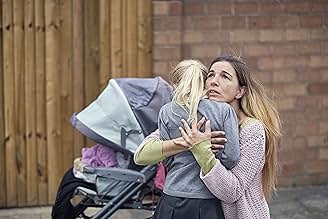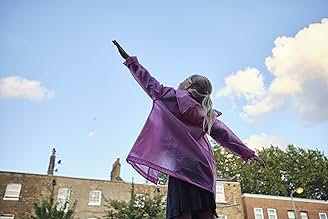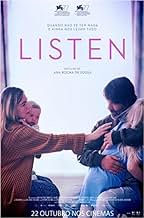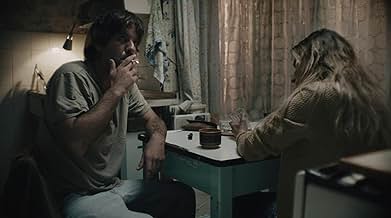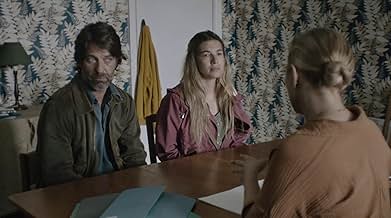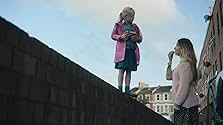Listen
- 2020
- 1h 13min
VALUTAZIONE IMDb
7,0/10
2178
LA TUA VALUTAZIONE
Due genitori immigrati portoghesi a Londra vengono privati della custodia dei loro figli dai servizi sociali affermando di non poterli mantenere. Con l'aiuto di una avvocatessa per i dirit... Leggi tuttoDue genitori immigrati portoghesi a Londra vengono privati della custodia dei loro figli dai servizi sociali affermando di non poterli mantenere. Con l'aiuto di una avvocatessa per i diritti umani fanno tutto il possibile per riaverli.Due genitori immigrati portoghesi a Londra vengono privati della custodia dei loro figli dai servizi sociali affermando di non poterli mantenere. Con l'aiuto di una avvocatessa per i diritti umani fanno tutto il possibile per riaverli.
- Regia
- Sceneggiatura
- Star
- Premi
- 36 vittorie e 30 candidature totali
Recensioni in evidenza
Based on a true story, the film is about a couple who has to fight to get their children back. It's portrayed very realistically and the direction is first rate. Enjoyed this a lot.
Another Portuguese quality movie, tackling a very serious and urgent issue that clearly needs more visibility.
I am glad to see that my home country is continuing the trend of making good film content. There is a stigma in Portugal where a lot of people believe that there aren't good ideas or movies coming out of the industry, but the reality is that the lack of support specially from the government in our own culture has made things tougher for amazing artists to be able to actually execute their ideas, so it's always good that not only we have a good movie, but it is also being recognized internationally in the prestigious awards ceremonies.
The movie tells the story of a real life ongoing issue within the UK and one that is probably not that well known around the world - poor families, are being ripped of their children if the social security services state that they are incapable to maintain them. Now this doesn't sound so bad when mentioned like this, but the reality is much, much darker... Even if families are poor, there are a lot of reported situations where they can still viably take care of their children, even with the financial difficulties, and instead of helping them out paying for specific needs like health related equipment for instance, social security services have no problem in taking the kids to feed a high demanding industry: adoption. There have been several real life reported cases where this is actually happening, poor families, destroyed, their children taken from them, simply for the profit of the adoption market - they give a hard time to the original families to connect with their children, once adoption is made it cannot be reversed and if the original parents try to get to their children and take them again they will be considered kidnappers.
It is a very heartbreaking and unfortunate real issue, and it is amazing that Portugal was able to make such a social statement, specially since a lot of the affected families are actually Portuguese. The acting is on point, Lucia Moniz has proven herself before but she shines on this movie, right next to her co-star Ruben Garcia.
For her directorial debut, Ana Rocha did an amazing job, although the movie has a lack of variety in its atmosphere, happening for most of its time in the same locations, which slightly gives you an emptiness feeling, it's a really important message, well executed, well acted and a must see. I was sad to hear that it wasn't considered as a foreign movie contender for the Oscars since it is partially spoken in English (the story takes place in the UK), I believe it would have had very good chances, one of the best movies coming out of Portuguese lands so far!
I am glad to see that my home country is continuing the trend of making good film content. There is a stigma in Portugal where a lot of people believe that there aren't good ideas or movies coming out of the industry, but the reality is that the lack of support specially from the government in our own culture has made things tougher for amazing artists to be able to actually execute their ideas, so it's always good that not only we have a good movie, but it is also being recognized internationally in the prestigious awards ceremonies.
The movie tells the story of a real life ongoing issue within the UK and one that is probably not that well known around the world - poor families, are being ripped of their children if the social security services state that they are incapable to maintain them. Now this doesn't sound so bad when mentioned like this, but the reality is much, much darker... Even if families are poor, there are a lot of reported situations where they can still viably take care of their children, even with the financial difficulties, and instead of helping them out paying for specific needs like health related equipment for instance, social security services have no problem in taking the kids to feed a high demanding industry: adoption. There have been several real life reported cases where this is actually happening, poor families, destroyed, their children taken from them, simply for the profit of the adoption market - they give a hard time to the original families to connect with their children, once adoption is made it cannot be reversed and if the original parents try to get to their children and take them again they will be considered kidnappers.
It is a very heartbreaking and unfortunate real issue, and it is amazing that Portugal was able to make such a social statement, specially since a lot of the affected families are actually Portuguese. The acting is on point, Lucia Moniz has proven herself before but she shines on this movie, right next to her co-star Ruben Garcia.
For her directorial debut, Ana Rocha did an amazing job, although the movie has a lack of variety in its atmosphere, happening for most of its time in the same locations, which slightly gives you an emptiness feeling, it's a really important message, well executed, well acted and a must see. I was sad to hear that it wasn't considered as a foreign movie contender for the Oscars since it is partially spoken in English (the story takes place in the UK), I believe it would have had very good chances, one of the best movies coming out of Portuguese lands so far!
From the little girl spying the world through her own lens to the mother's despair for the loss of her children, this movie is both a look at one side of our complicated, sometimes messed-up society, and a cinematographic experience for a young director.
Keeping my expectations low, I was surprised by how much I enjoyed this. The director, Ana Rocha de Sousa, shows her ability to catch emotions from the right shot. I was moved by Lúcia Moniz's performance. I do wonder how accurate this story is to reality... I sure hope it isn't, but I'm not keeping my hopes up for that.
However, the movie is short, which it shows as the story comes to a resolution rather quickly. Too quickly for what we expect the reality of social services to be. All feels too simple for what is a very complicated process.
In any case, bravo.
Keeping my expectations low, I was surprised by how much I enjoyed this. The director, Ana Rocha de Sousa, shows her ability to catch emotions from the right shot. I was moved by Lúcia Moniz's performance. I do wonder how accurate this story is to reality... I sure hope it isn't, but I'm not keeping my hopes up for that.
However, the movie is short, which it shows as the story comes to a resolution rather quickly. Too quickly for what we expect the reality of social services to be. All feels too simple for what is a very complicated process.
In any case, bravo.
A couple of Portuguese emigrants from the London suburbs face serious problems when Social Services decide to take their children away.
Ana Rocha de Sousa cleared herself from the comparisons of her film with those of Ken Loach, one of my favorite British directors, who focuses mainly on social problems and discriminatory acts in the United Kingdom, but it is evident that the Portuguese director has in her first feature the "British style" present (she studied at London Film School), in her own way.
It is such a real and powerful drama that it is difficult (or impossible, say) not to feel uncomfortable and disturbed watching Listen, much because of the expressiveness and emotion that Lúcia Moniz (as Bela) conveys, in contrast with the silence and emotional pain showned by Rúben Garcia (as Jota).
The photography is very particular and interesting, out of the standard that we are used to in Portuguese films.
All the recognition given to this film is more than deserved.
Ana Rocha de Sousa cleared herself from the comparisons of her film with those of Ken Loach, one of my favorite British directors, who focuses mainly on social problems and discriminatory acts in the United Kingdom, but it is evident that the Portuguese director has in her first feature the "British style" present (she studied at London Film School), in her own way.
It is such a real and powerful drama that it is difficult (or impossible, say) not to feel uncomfortable and disturbed watching Listen, much because of the expressiveness and emotion that Lúcia Moniz (as Bela) conveys, in contrast with the silence and emotional pain showned by Rúben Garcia (as Jota).
The photography is very particular and interesting, out of the standard that we are used to in Portuguese films.
All the recognition given to this film is more than deserved.
A searing indictment of the UK's indictment of the UK's social service system if ever there was one, Listen is basically a low-budget film about a poor Portuguese couple living in London who have their kids taken away under the most dubious of circumstances.
Their little girl is deaf with bruises on her back, the son is violently ill and the other one is just a baby who won't stop crying. Not an ideal day for the welfare checkers to come a-knocking you might say, and once the adoption process stops it's very hard to stop.
Listen has good acting from all participants (apart from the kid who plays the little boy, he seemed a bit too 'polished' to me) and a very believable plot to boot which must be every mother's worst nightmare. It could easily have been longer though, with the most abrupt of endings arriving at around the 70 minute mark.
A shame really, as with a bit more time spent on the narrative and a few extra scenes this could've been something a bit special. Instead, we have a decent piece of cinema which feels as a whole unsatisfying with a pretty disappointing conclusion.
Ah well. It was worth watching once at least. 5/10.
Their little girl is deaf with bruises on her back, the son is violently ill and the other one is just a baby who won't stop crying. Not an ideal day for the welfare checkers to come a-knocking you might say, and once the adoption process stops it's very hard to stop.
Listen has good acting from all participants (apart from the kid who plays the little boy, he seemed a bit too 'polished' to me) and a very believable plot to boot which must be every mother's worst nightmare. It could easily have been longer though, with the most abrupt of endings arriving at around the 70 minute mark.
A shame really, as with a bit more time spent on the narrative and a few extra scenes this could've been something a bit special. Instead, we have a decent piece of cinema which feels as a whole unsatisfying with a pretty disappointing conclusion.
Ah well. It was worth watching once at least. 5/10.
Lo sapevi?
- QuizIn December 2020, Portugal's submission Listen was disqualified for having more than half of its dialogue in English. Portugal's selection committee submitted a second film, Vitalina Varela.
I più visti
Accedi per valutare e creare un elenco di titoli salvati per ottenere consigli personalizzati
- How long is Listen?Powered by Alexa
Dettagli
Botteghino
- Lordo in tutto il mondo
- 330.179 USD
- Tempo di esecuzione1 ora 13 minuti
- Colore
Contribuisci a questa pagina
Suggerisci una modifica o aggiungi i contenuti mancanti

![Guarda Trailer [OV]](https://m.media-amazon.com/images/M/MV5BMzQwYTVjZTgtNWM4Yy00OTk4LTkwYTktYzhhNGU0YTI1Mjk1XkEyXkFqcGdeQXRyYW5zY29kZS13b3JrZmxvdw@@._V1_QL75_UX500_CR0)
